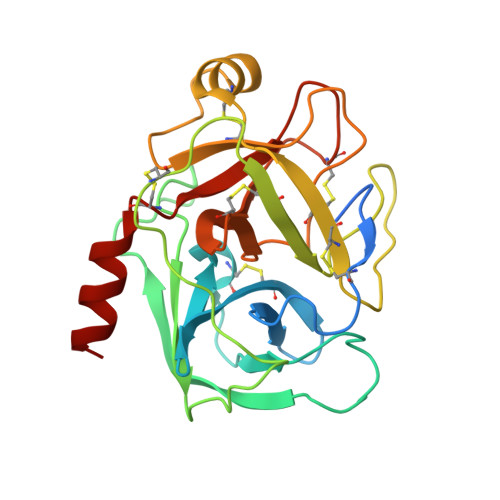Crystal structures of human factor Xa complexed with potent inhibitors.
Maignan, S., Guilloteau, J.P., Pouzieux, S., Choi-Sledeski, Y.M., Becker, M.R., Klein, S.I., Ewing, W.R., Pauls, H.W., Spada, A.P., Mikol, V.(2000) J Med Chem 43: 3226-3232
- PubMed: 10966741
- DOI: https://doi.org/10.1021/jm000940u
- Primary Citation of Related Structures:
1EZQ, 1F0R, 1F0S, 1F0T, 1F0U - PubMed Abstract:
Involved in the coagulation cascade, factor Xa (FXa) is a serine protease which has received great interest as a potential target for the development of new antithrombotics. Although there is a great wealth of structural data on thrombin complexes, few structures of ligand/FXa complexes have been reported, presumably because of the difficulty in growing crystals. Reproducible crystallization conditions for human des-Gla1-45 coagulation FXa have been found. This has led to an improvement in the diffraction quality of the crystals (about 2.1 A) when compared to the previously reported forms (2.3-2.8 A) thus providing a suitable platform for a structure-based drug design approach. A series of crystal structures of noncovalent inhibitors complexed with FXa have been determined, three of which are presented herein. These include compounds containing the benzamidine moiety and surrogates of the basic group. The benzamidine-containing compound binds in a canonical fashion typical of synthetic serine protease inhibitors. On the contrary, molecules that contain surrogates of the benzamidine group do not make direct hydrogen-bonding interactions with the carboxylate of Asp189 at the bottom of the S1 pocket. The structural data provide a likely explanation for the specificity of these inhibitors and a great aid in the design of bioavailable potent FXa inhibitors.
- Department of Structural Biology, Aventis Pharma, 13, Quai J. Guesde, F-94403 Vitry/Seine, France.
Organizational Affiliation:



















